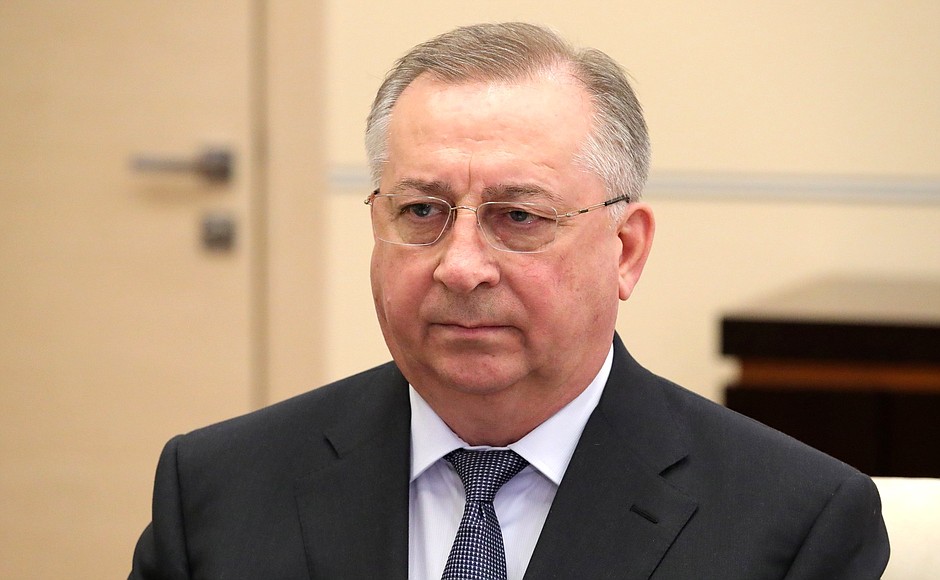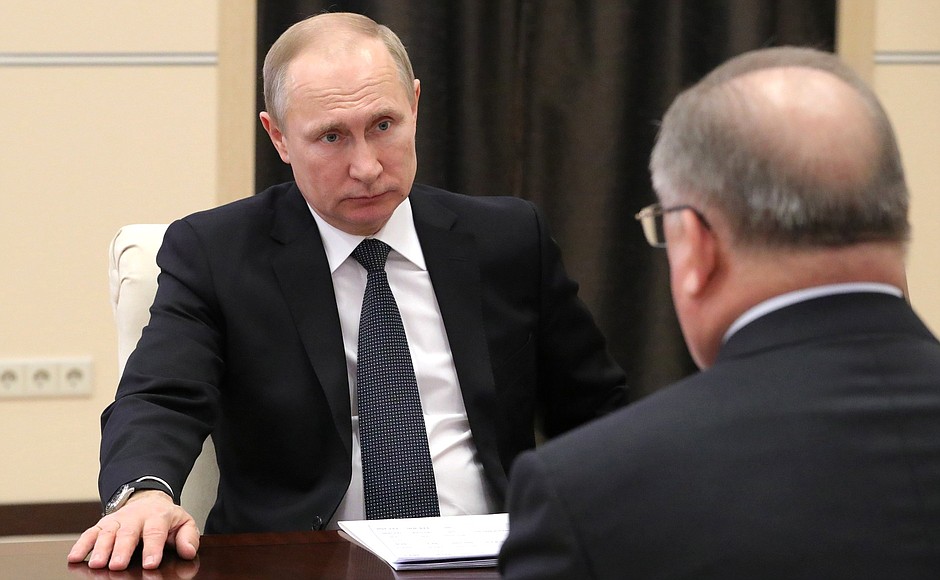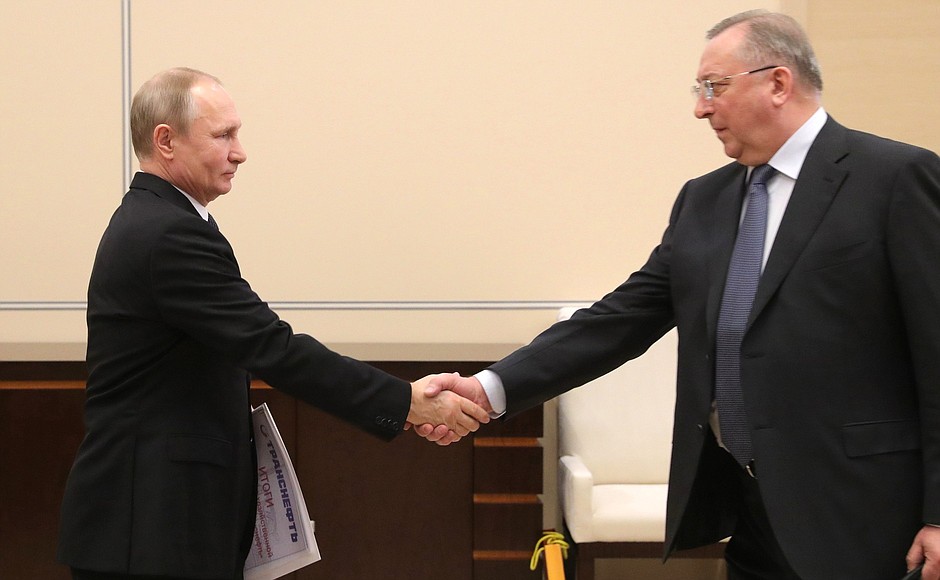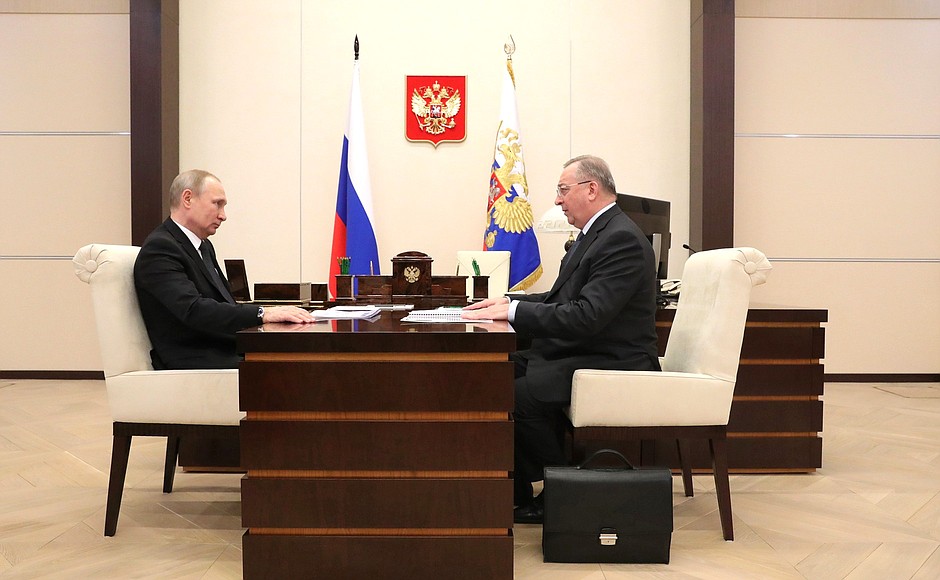President of Russia Vladimir Putin: Mr Tokarev, this year Transneft marks its 25th anniversary. During these years, it has become the largest international company of its kind.
Let us begin with this. Please tell me what the company is like today. Of course, I can tell from the documents, but I would appreciate your comments. And, of course, the results from last year.
President of Transneft Nikolai Tokarev: Mr President, first of all, I would like to sincerely congratulate you on your re-election on behalf of the entire 115,000 Transneft staff and wish you success in developing and strengthening Russia. Transneft is always close by; it will always support you in this pursuit. You can count on us.
Vladimir Putin: Thank you very much.
Nikolai Tokarev: Speaking about this small anniversary, of course, we have something to be proud of. We have done a lot in 25 years. Today Transneft is present in 64 Russian regions: these are the regions of our operations, eight federal districts and 115,000 employees.
Over the time that passed, especially in the last 10 years, we have built 19,000 kilometres of line pipes, including 9,000 kilometres under new construction projects; and there was the replacement of line pipes, or the technical resource, that has been used – that’s another 10,000 kilometres; and 50 oil pumping stations.

Vladimir Putin: Is this over last year?
Nikolai Tokarev: This is over the last 10 years.
Vladimir Putin: Are there about 500 in total?
Nikolai Tokarev: We have 70,000 kilometres of line pipes, including about 20,000 for oil products and 50,000 kilometres of oil main lines.
Vladimir Putin: Are these the pumping stations?
Nikolai Tokarev: The 50 stations are the new ones.
Vladimir Putin: And in total?
Nikolai Tokarev: There are over 500 oil pumping stations of various capacities in total.
During the last 10 years, especially with the implementation of new large projects, we have created about 13,500 jobs, including 9,000 in Eastern Siberia, the Primorye, Khabarovsk and Amur territories.
Thanks to your support, the most important projects include the first and second stages of Eastern Siberia–Pacific Ocean pipeline, the Baltic Pipeline System, Skovorodino–Mohe to China, Zapolyarye–Purpe, Purpe–Samotlor and Kuyumba–Taishet. There also are the new pipelines for oil products such as the North project, thanks to which we have increased transit to Primorsk by 15 million tonnes, and the South project, its first and second stages, which joined the southern oil processing plants into a single line starting with Volgograd, and today we transfer oil products that way by pipes.
An important breakthrough in import replacement is a special landmark for us. We have not started this work because of the sanctions. The Board, the company’s management, made all the necessary decisions about production localisation in Russia in 2008–2009. This relates both to our plants and joint ventures we can create. We allocated money and set 26 priority areas we worked on.
Today we have completed our work on 23 products from this priority list. As of today, Russia produces 93 percent of the equipment we need, which we buy. The programme stipulates that we reach 97 percent in two years, by 2020. And we will really do this, because we have the research and development reports and they give us hope.
In conjunction with our Italian partners, we have built interesting enterprises in Chelyabinsk. We now fully meet industry demand for our pumps. You were in Chelyabinsk, and you saw it.

A new joint venture with an Italian company will become operational in August. It will make electric motors and drives for these pumps. We are making our own molecule which we use to produce an anti-turbulent additive, which increases pumping capacity. Until now, there has been only one seller and manufacturer on the market, the US Baker Hughes. Now we are making it here in Russia with our Tatar partners.
Strong gains have been achieved in energy efficiency as well. We managed to achieve savings of about 16 percent in energy consumption, that is, about 7 billion rubles, using innovative technologies and advanced modes of operation with the new equipment.
We are continuing our work in this area. According to the KPMG audit, we achieved the world’s best energy consumption per unit of Transneft transport product. These are the findings of an authoritative audit company.
I will not dwell on our social programmes…
Vladimir Putin: What is the average salary?
Nikolai Tokarev: The average salary is 90,000 rubles depending on the region…
Vladimir Putin: Do you plan to increase salaries this year?
Nikolai Tokarev: We adjusted them for inflation this year and we plan to do so almost annually. Of course, it is a little lower in Central Russia but over 100,000 rubles in the Russian Far East, eastern Siberia, and the north.
We have a voluntary medical insurance programme and a solid and competitive non-government pension fund, the third largest after Gazprom and Russian Railways. So, our employees are motivated by the prospect of receiving corporate pensions.
Rural schools are part of another major social programme. In the next four years we plan to repair and overhaul rural schools, install modern equipment, interactive technology and classrooms for physics, chemistry and mathematics. This programme covers 240 schools and is already underway.
We are also trying to focus on other areas, such as medicine, education, culture and sports, as well as religion, so no one feels left out.
Vladimir Putin: Good.
<…>

